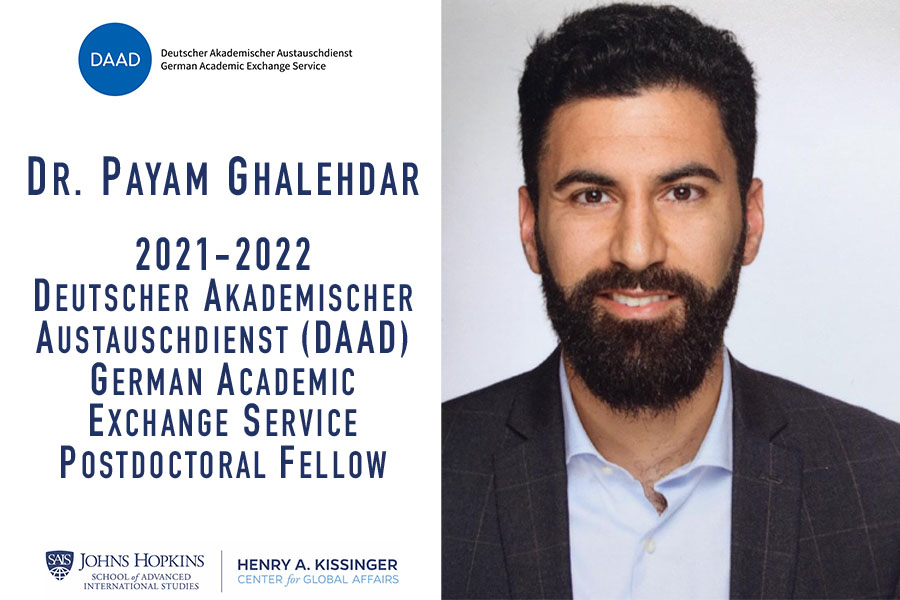Featured Scholar: Dr. Payam Ghalehdar, 2021-2022 DAAD Postdoctoral Fellow

In this Featured Scholar article, the Henry A. Kissinger Center for Global Affairs spoke with Dr. Payam Ghalehdar, a 2021–2022 Deutscher Akademischer Austauschdienst (DAAD) / German Academic Exchange Service Postdoctoral Fellow at the Center, to discuss his ongoing work on the role of emotions in the formulation of U.S. foreign policy.
Dr. Ghalehdar is a DAAD Postdoctoral Fellow at the Henry A. Kissinger Center for Global Affairs of the Johns Hopkins University School of Advanced International Studies (SAIS). His research interests span US foreign policy, grand strategy, and the role of emotions in foreign policy decision-making. His first book, The Origins of Overthrow, which claims that US regime change interventions have been a consequence of the impact of emotional frustration on presidential decision-making, came out in 2021 with Oxford University Press. At SAIS, he looks at the role of transatlantic emotional attachments in the founding of NATO. Payam obtained his PhD from the European University Institute. Prior to joining the Kissinger Center, he was a Lecturer in the Department of Politics and International Studies at the University of Cambridge, a Research Fellow with the International Security Program in the Belfer Center for Science and International Affairs at the Harvard Kennedy School, and a Research Fellow in the Department of Political Science at the University of Göttingen.
To what extent do emotions play a role in the formulation of American foreign policy? This is a core focus of Dr. Payam Ghalehdar’s ongoing research. His first book, The Origins of Overthrow (Oxford University Press, 2021) also explored the influence of emotional upheaval, examining five cross-regional cases of U.S.-led regime change operations and arguing that in most of these cases, the operations can be traced to the level of emotional frustration experienced by the American president and his closest advisors. Once such emotional frustration sets in, Dr. Ghalehdar argues, it increases the likelihood of resort to use of force in the context of regime change operations. Drawing on archival research at multiple presidential libraries and the Library of Congress, Dr. Ghalehdar takes a historical approach to explore such efforts in Cuba (1906), Nicaragua (1909–12), the Dominican Republic (1963–65), and Iraq (2001–03), while also looking at a case in which regime change operations by the United States were possible but did not occur, namely, in Iran (1979). According to Barbara Keys, the book is “brilliant, provocative, and compelling” and should be “urgently put in the hands of US policymakers”.
In addition to the academic work of his book project, Dr. Ghalehdar published a policy-relevant op-ed in The National Interest, “This Is Not the Iran Regime Strategy You're Looking For,” in which he argued in 2018 that President Trump’s foreign policy towards Iran, especially in his withdrawal from the Joint Comprehensive Plan of Action (JCPOA), was not an effort at regime change. “Many observers see these measures as a clear sign that Trump wants to overthrow the Iranian regime,” he wrote, arguing instead that “Trump’s end-game is a negotiated settlement, not the forcible overthrow of the Islamic Republic.”
As a 2021–2022 Deutscher Akademischer Austauschdienst (DAAD) / German Academic Exchange Service Postdoctoral Fellow at the Henry A. Kissinger Center for Global Affairs, Dr. Ghalehdar most recently published an op-ed in The Hill (“Iran Thinks It Has the Upper Hand in Vienna — Here’s Why It Doesn’t”) during the renegotiation of the JCPOA in 2021. “Rather than compelling the U.S. government to make concessions,” Dr. Ghalehdar writes, “maximalist Iranian demands might cause the United States to walk away from negotiations and resort to a containment strategy instead, with all the potential risks of escalation.”
As a DAAD Postdoctoral Fellow in Washington, DC, Dr. Ghalehdar is now focusing on the role of emotions in American foreign policy decision-making as it underpinned the origins and crises of NATO. In examining the transatlantic alliance, Dr. Ghalehdar’s original and innovative approach differs from the predominant view about Western foreign policymaking, which emphasizes rational calculations. By contrast, Dr. Ghalehdar notes that the traditional explanations for NATO’s creation, namely, that it is security-based and founded on a common identity (à la constructivism), are inadequate. Instead, Dr. Ghalehdar emphasizes the emotional attachments of the United States (or American decisionmakers) towards Europe. In his work, Dr. Ghalehdar plans to focus on the Obama Administration’s relationship with NATO, as the president had noted he was “America’s first pacific president.”[1]
Dr. Ghalehdar joined the Kissinger Center after serving as a Postdoctoral Research Fellow in the International Security Program of the Belfer Center for Science and International Affairs at the Harvard Kennedy School in Cambridge, MA. The Center’s application of historical thinking to major global challenges interested Dr. Ghalehdar, who takes a similar approach in his own research. The Center also provides resources to engage in both an academic and policy-relevant outputs and engagement, which also interested Dr. Ghalehdar, as he seeks “to not have a purely scholarly debate or treatment of these issues, but to engage policymakers” on them.